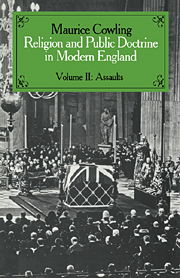Book contents
- Frontmatter
- Foreword
- Contents
- Projected contents of Volume III (for publication c. 1988–90)
- INTRODUCTION
- I THE ASSAULT ON THE EIGHTEENTH CENTURY
- II THE ASSAULT ON CHRISTIANITY
- III THE ASSAULT ON CHRISTIANITY IN THE TWENTIETH CENTURY
- 8 The Revision of Ethical Earnestness I
- 9 The Revision of Ethical Earnestness II
- 10 The Revision of Ethical Earnestness III
- IV ASSAULTS ON THE ASSAILANTS
- CONCLUSION: ASSAULTS AND ACCOMMODATIONS
- Notes
- Index of main names
10 - The Revision of Ethical Earnestness III
Published online by Cambridge University Press: 23 December 2009
- Frontmatter
- Foreword
- Contents
- Projected contents of Volume III (for publication c. 1988–90)
- INTRODUCTION
- I THE ASSAULT ON THE EIGHTEENTH CENTURY
- II THE ASSAULT ON CHRISTIANITY
- III THE ASSAULT ON CHRISTIANITY IN THE TWENTIETH CENTURY
- 8 The Revision of Ethical Earnestness I
- 9 The Revision of Ethical Earnestness II
- 10 The Revision of Ethical Earnestness III
- IV ASSAULTS ON THE ASSAILANTS
- CONCLUSION: ASSAULTS AND ACCOMMODATIONS
- Notes
- Index of main names
Summary
‘With our present industrial technique we can, if we choose, provide a tolerable subsistence for everybody. We could also secure that the world's population should be stationary if we were not prevented by the political influence of Churches which prefer war, pestilence and famine to contraception. The knowledge exists by which universal happiness can be secured; the chief obstacle to its utilization for that purpose is the teaching of religion. Religion prevents our children from having a rational education; religion prevents us from removing the fundamental causes of war; religion prevents us from teaching the ethic of scientific co-operation in place of the old fierce doctrines of sin and punishment. It is possible that mankind is on the threshold of a golden age; but, if so, it will be necessary first to slay the dragon that guards the door, and this dragon is religion.’
Bertrand Russell Has Religion Made A Useful Contribution to Civilization? 1930 pp. 29–30.‘There must be manifestations. We must change back to the vision of the living cosmos; we must. The oldest Pan is in us, and he will not be denied. In cold blood and in hot blood both, we must make the change. That is how man is made. I accept the must from the oldest Pan in my soul, and from the newest me. Once a man gathers his whole soul together and arrives at a conclusion, the time of alternatives has gone. I must. No more than that. I am the First Man of Quetzalcoatl. I am Quetzalcoatl himself, if you like. A manifestation, as well as a man. […]
- Type
- Chapter
- Information
- Religion and Public Doctrine in Modern England , pp. 247 - 284Publisher: Cambridge University PressPrint publication year: 1985



